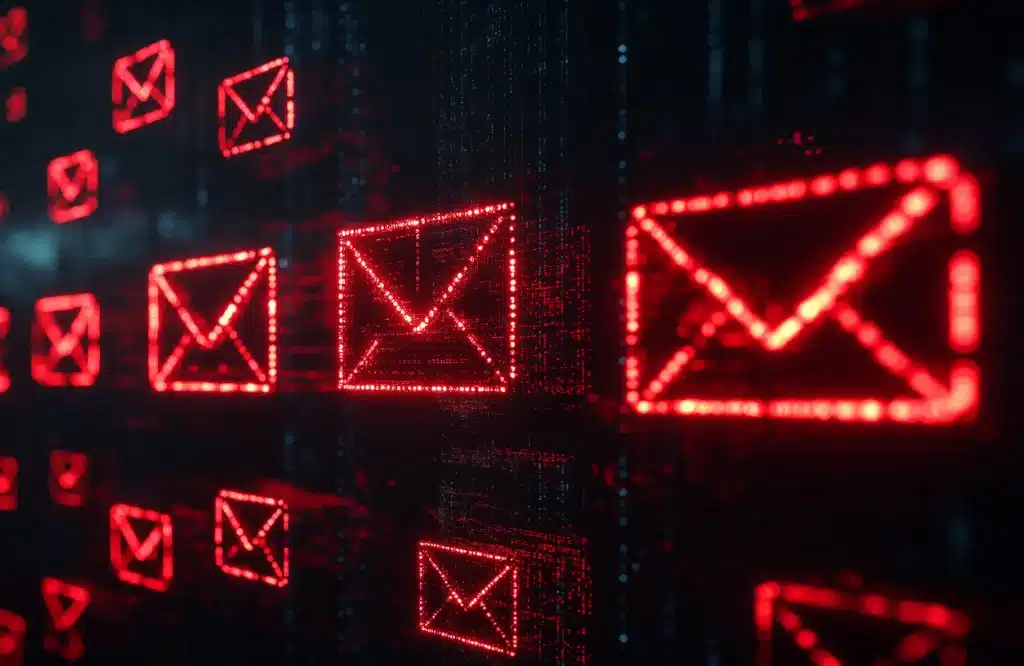
Phishing is a tactic used by cybercriminals to infect your business’s systems with malware or scam your employees into giving away private information. These kinds of attacks pick up around the holidays when people purchase goods and services over the internet and businesses are stretched thin dealing with holiday schedules and a deluge of emails.
This makes the holiday season the most vulnerable time of the year with higher risk and more frequent attacks, but the good news is that you can counter these threats with holiday security awareness.
What is holiday phishing?
As mentioned above, phishing is a method of delivering online attacks used by cybercriminals. For businesses, this usually consists of emails from senders posing as business partners, vendors, or members of the targeted organization.
The emails ask the recipient to share private data like login credentials or bank details, often by providing a fake story or crisis in hopes that the receiver won’t realize they are being lied to. Alternatively, the email may try and convince the recipient to download malware onto their workstation or your servers. Either way, the result is data breaches, lost funds, and/or a damaged business reputation.
This kind of attack increases in frequency during the holidays because cybercriminals know that you are getting inundated with emails from customers, partners, and B2B vendors, and they are hoping to slip by.
Preventing phishing attacks with security awareness
Security awareness training is a crucial tool to safeguard your business from phishing attacks during the holiday season and beyond. Through training, employees can learn to spot phishing emails, report security incidents, and practice good cyber hygiene. Investing in ongoing security awareness training fosters a culture of vigilance and responsibility, and empowers your team to be the first line of defense against phishing and other threats. Here are some key areas to focus on in your security awareness training to counter phishing and stay safe during the holidays:
Checking the sender’s email address
One of the easiest ways to spot a phishing attack is checking the sender domain. Legitimate emails from real organizations usually have clean and simple addresses originating from their primary website, such as “service@paypal.com.”
If the sender address is too long, strange looking, or has errors or numbers in it, it’s a good bet it’s fake. If an email is from an address like “service@globalsupport.paypal1.net,” delete the email or, better yet, report it.
Spotting grammatical errors
Emails from legitimate organizations are created by teams of marketing and communications professionals with software that help them generate content. Cybercriminals do not have these resources, so you will often find phishing emails to have poor grammar, misspelled words, odd formatting, or an otherwise unprofessional appearance.
Separating personal and professional emails
If your employees are going to check personal emails at work, ensure that they:
- Do so from their own device (which is not connected to your network)
- Do not use their work email address for any non-work-related purpose
- Practice the same email security best practices as they do with work emails
This is because attacks on personal email accounts increase even more during the holidays, and personal email accounts will have many more phishing messages than business ones.
Your employees might receive emails promoting too-good-to-be-true holiday deals or messages from banks or vendors claiming a problem with a payment or unclaimed funds. These pose a high risk to your systems as well as your employees’ personal finances, so keep them as far away from your network as possible.
Using the right tools for the job
Cybercriminals use technology to generate phishing attacks and find victims, but your own IT solutions can level the playing field. Instruct your employees on how to implement and configure email filtering tools to stop phishing messages before they reach an inbox.
Configuring these tools should be done carefully, however, as you don’t want to turn up the security to the maximum and risk legitimate messages being blocked. Work with your IT staff or IT services provider to find a good middle ground that protects your inboxes without harming productivity.
Get top-notch security awareness training from experts
These are just some basic tips for keeping your business safe from holiday phishing attacks. To ensure your workforce gets the right training to protect your company year-round from all manner of cyberthreats, contact Spectrumwise today.
Our cybersecurity consultants have decades of experience in the field and stay current on the newest online attacks and tactics employed by cybercriminals. We’ll ensure your employees are equipped with the knowledge required to keep cyberattacks from bringing down your business.



